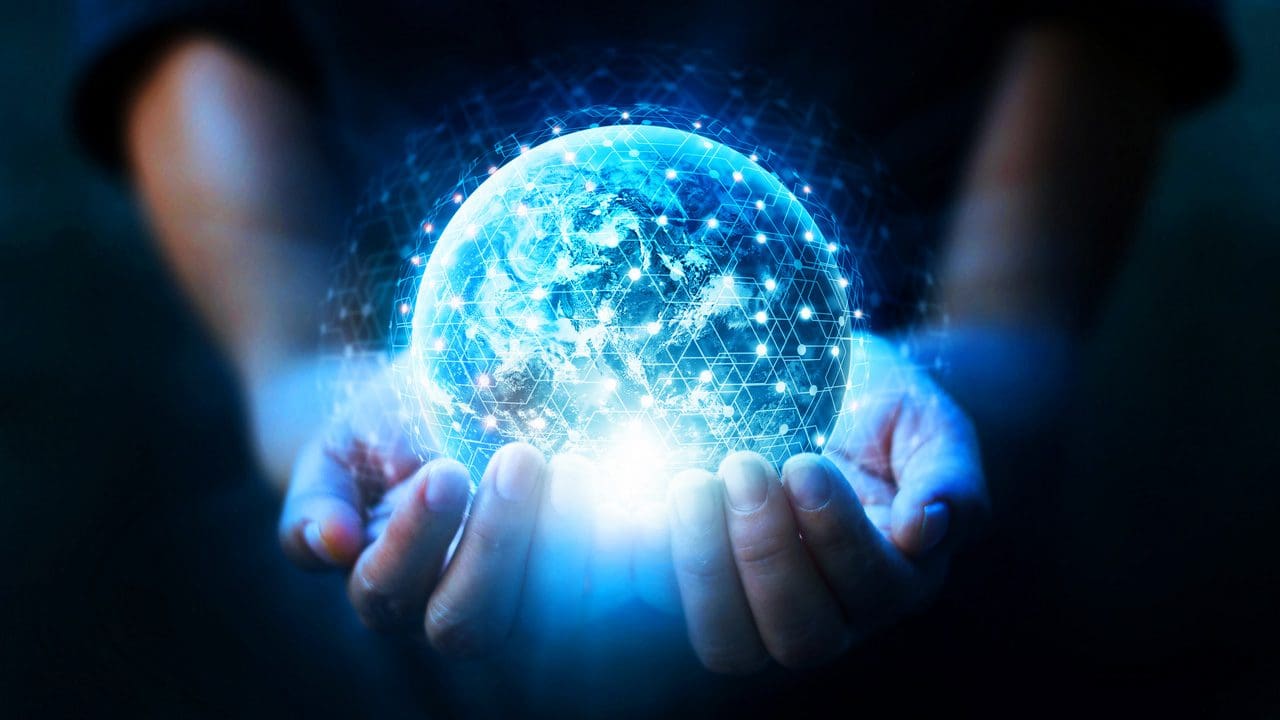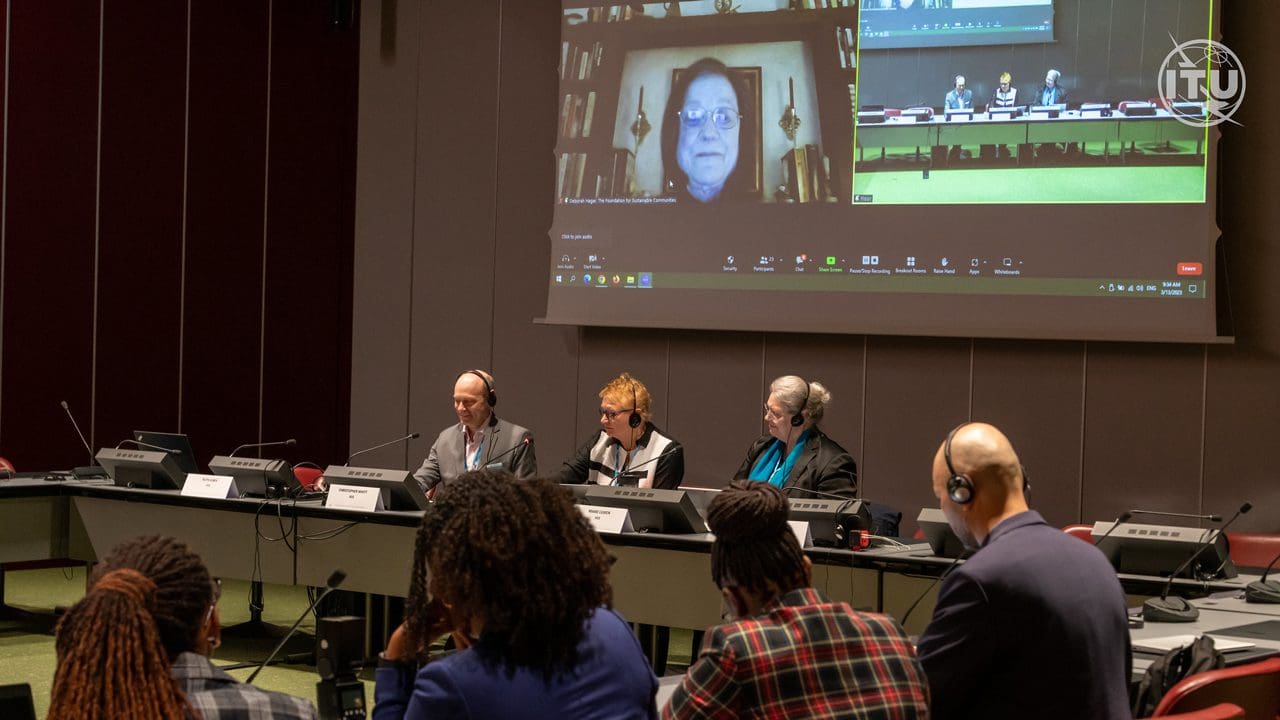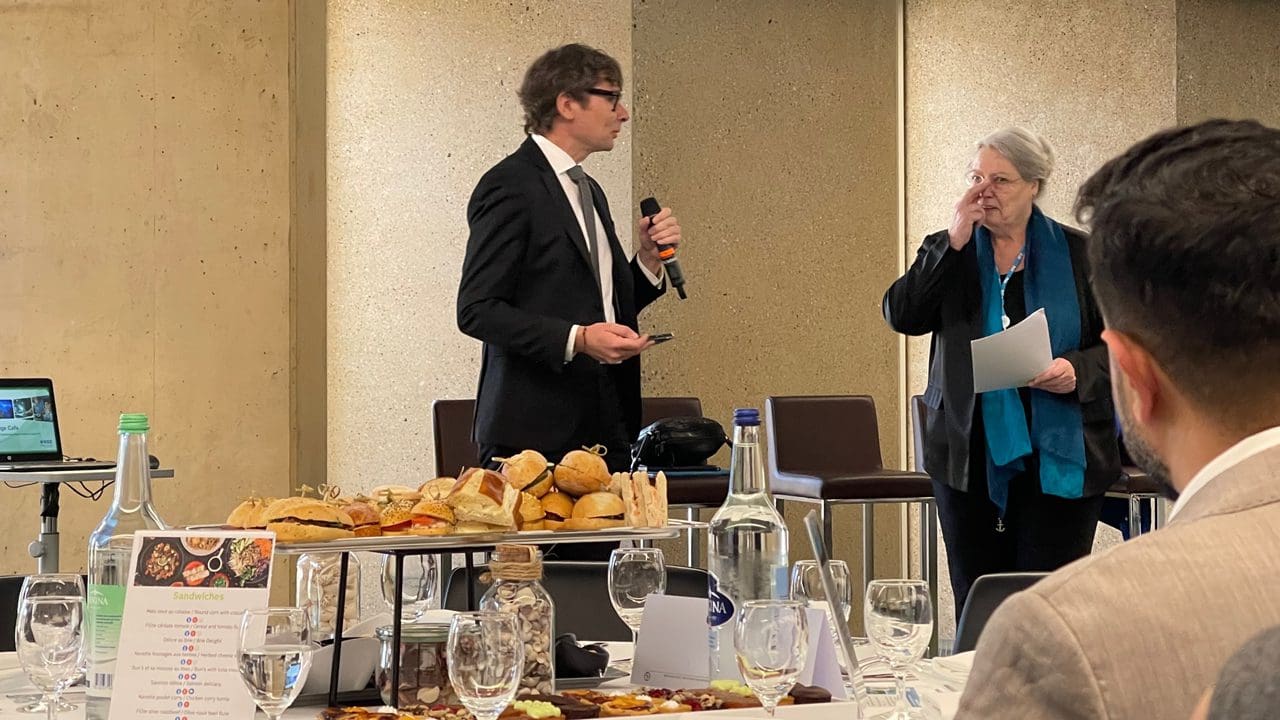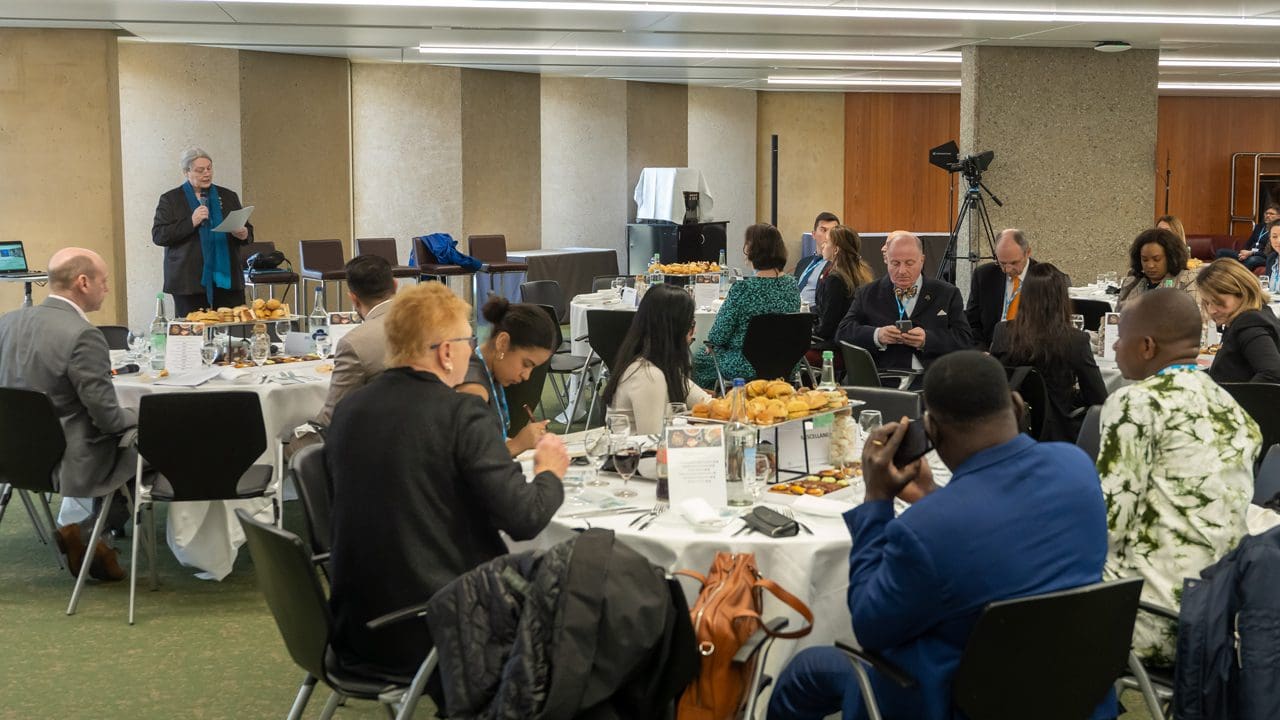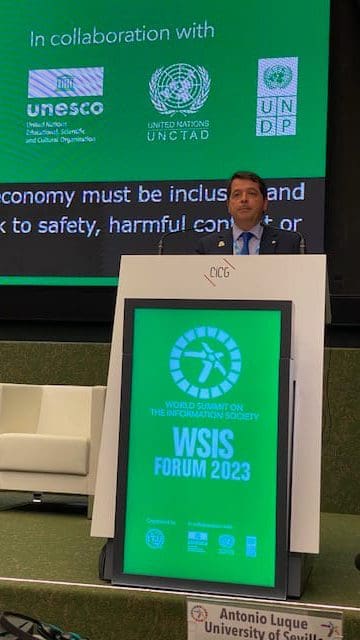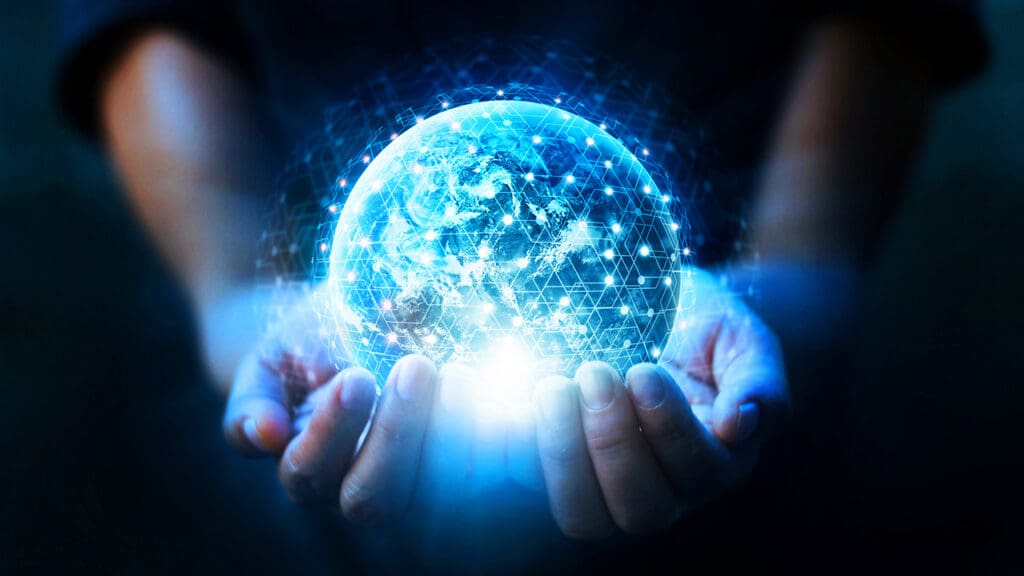The annual World Summit on the Information Society (WSIS) Forum brings together the largest gathering of the Information and Communications Technologies (ICT) community, which focuses on making the information society accessible to all. The WSIS Forum provides an opportunity for multi-stakeholder cooperation in providing meaningful connections to the information society and allows IEEE to showcase its work in support of sustainability.
The 2023 WSIS Forum was held 11-17 March with 2700 participants from over 150 countries attending 250 onsite and remote sessions. Many participants stopped by the IEEE booth to learn about IEEE’s work in contributing to the advancement of the UN Sustainable Development Goals (SDGs).
The IEEE theme for the forum was “Sustainable Stewardship Through Standards Development and Application”. From the IEEE Thematic Workshop on Standards and Sustainability to the Knowledge Café discussion on Beyond Planet Positive 2030, all the IEEE volunteers who attended successfully shared the work their standards groups are doing to support advancing technology for humanity.
View a full list of IEEE-organized events at the 2023 WSIS Forum
How Standards and Sustainability Go Hand-in-Hand
The IEEE Thematic Workshop “Supporting the Transition to a Stronger, Greener, and Sustainable Future through Standards and Best Practices” focused on best practices and standards for addressing sustainability, environmental stewardship, and climate change challenges. Raised in the discussion were IEEE Standard P7800™ for Addressing Sustainability, Environmental Stewardship and Climate Change Challenges in Professional Practice, and IEEE P7010.1™ on Environmental Social Governance (ESG) and Social Development Goal (SDG) Action Implementation and Advancing Corporate Social Responsibility. It featured a panel comprised of the following IEEE volunteers and staff:
Maike Luiken, Chair, IEEE P7800™ Addressing Sustainability, Environmental Stewardship and Climate Change, Chair, IEEE Planet Positive 2030 Initiative
Ruth Lewis, Chair, IEEE Society for Social Implications of Technology (SSIT) Standards Committee
Deborah Hagar, Chair, IEEE P7010.1™ Advancing Corporate ESG and Social Responsibility
Christopher Whitt, President, IEEE Oceanic Engineering Society
Karen Mulberry, Senior Manager, Public Affairs, IEEE Standards Association, moderated the panel.
The IEEE volunteer-led panel discussed what standards developers and users are doing today to address sustainability and climate change. Panelists provided details on how to go beyond traditional approaches and sustainability targets to provide a wider cultural foundation for guiding the care of the planet, including technological innovations and the application of ethical design principles based on IEEE standards and best practices.
The panel also covered breakthroughs in collaboration, collective action, communication, governance, gaps, and business model reforms that are needed to be aligned with technologically sound solutions and innovations that can be adopted and practically deployed, which include approaches underway at the Oceanic Engineering Society to better understand and manage the ocean in order to sustainably benefit from its ecosystem and economic services.
The IEEE Knowledge Café
This year’s IEEE Knowledge Café theme was “Beyond Strong Sustainability: Catalyzing a Planet Positive Future for Generations to Come” and was an opportunity to showcase the progress of IEEE SA’s Planet Positive 2030 initiative. Maike Luiken opened the interactive session by welcoming Tomas Lamanauskas, Deputy Secretary General of the ITU.
During this interactive session, IEEE volunteers acted as table facilitators, setting the stage for discussion and selecting topics based on charters from the IEEE SA Planet Positive work, including Accountability, Oceans, Smart Cities, and Policy. The background of each subject was presented and tables shared lively discussions on what they saw as the biggest sustainability gaps for that topic and suggestions for how to address them.
High-Level Policy Sessions
High-Level Policy sessions gathered high-ranking officials within the WSIS stakeholder community, representing government, private sector, civil society, academia, and international organizations. High-Level Track Facilitators (HLTFs) moderated the interactive policy statement sessions. They captured the vision, emerging trends, opportunities, and challenges governments face as they implement sustainable development goals.
During High-Level Policy Session 2: Enabling Environment, Thomas Coughlin spoke about how standards are essential in achieving sustainability. He noted that standards provide the critical framework for advancing sustainable technology, prioritizing people, the planet, and purpose-driven progress. They play an essential role in providing the procedures, guidelines, and specifications by which goods and services are produced, used, discarded, and recycled. This is an integral part of IEEE’s mission to advance technology for the benefit of humanity, and many diverse individuals and communities of IEEE around the world are using their expertise and know-how to help develop solutions for the critical sustainability issues the planet faces today.
Maike Luiken was a panel member for the discussion on “Digital Cooperation and Partnerships for Inclusive Sustainable Development.” She noted that as we step closer to 2030, navigating the complexities of pursuing the UN SDGs needs to consider the diversity in culture, local, regional and global conditions and needs, and the varying contexts around the globe. It also requires flexibility and practical guidance on decisions and the implementation of these decisions by individuals, communities, companies, organizations, and governments.
She emphasized that the technical work that IEEE members do is increasingly expanding to new areas of technology and beyond technical solutions to addressing sustainable development and being inclusive of ethical and human values. The ongoing development of these powerful technologies and disruptive innovations in ICT demands a keener focus on social responsibility and accountability from the global technology community.
For example, IEEE focuses on best practices and standards for addressing sustainability, environmental stewardship, and climate change challenges through a pragmatic lens–such as standard P7800™ for Addressing Sustainability, Environmental Stewardship and Climate Change Challenges in Professional Practice, and IEEE P7010.1™ on Environmental Social Governance (ESG) and Social Development Goal (SDG) Action Implementation and Advancing Corporate Social Responsibility.
She remarked that IEEE, working in partnership with many other organizations, government and intergovernmental bodies, industry, academia, and more, has developed an ecosystem of programs and initiatives. The output of that work is best practices, standards, and certification programs that are open globally for partners to use in their efforts to help advance the 2030 Sustainable Development Agenda.
IEEE as a High-Level Policy Track Facilitator
IEEE had the honor of having two representatives chosen to be High-Level Policy Track Facilitators and lead panel discussions of ministers and government officials during the two-day ministerial event that was held during WSIS week.
Antonio Luque, University of Seville, Spain (Region 8) led Session 6: Digital Economy and Trade/Financing for ICT.
The session discussed the opportunities that new digital economies present for development through public-private partnerships, research and development, and education and the initiatives the participants take to overcome the barriers to digital trade.
Antonio noted, “Bridging the digital divide is essential to fully exploit the benefits that digital trade can bring to everyone. Access, availability, and affordability should be the driving forces of digitalization.”
The near future will see increased confidence and trust in digital businesses if we are able to solve the challenges and provide equal access to connectivity and services. Bridging the digital divide is key for this, and the opportunities that will open are worth the effort.”
Karen Mulberry led Session 3: Building Confidence and Security in the Use of ICTs.
Ministers and panelists discussed the ongoing challenge of security, risks, and impacts of cyber threats and the need to protect and maintain trust in digital platforms and information. As more information, services, and knowledge are online, access to a safe environment is important for all to build a better ICT environment.
The IEEE @ WSIS Forum 2023 Delegation had many opportunities to exchange valuable experiences and insights on how standards development and the work of IEEE supports the UN’s Sustainable Development Goals.
To learn more about WSIS Forum 2023, view the event’s highlights and outcomes or watch on-demand participation videos to learn more about IEEE’s efforts to contribute to sustainable development at WSIS Forum 2023.


